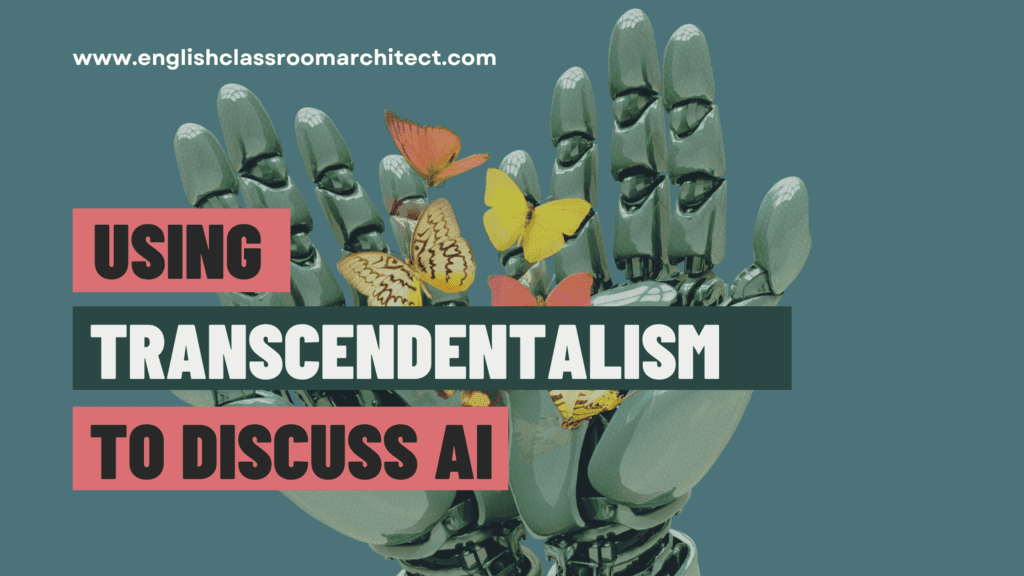As AI in education and artificial intelligence in general becomes more prevalent and available, students need to explore the opportunities and ethical implications of the technology. As the landscape changes, we as English teachers will have to change too. It’s understandable to be concerned about whether or not students will cheat with AI and pass off generated chats as their own essays or responses. If you look on YouTube, you will find pages of videos with suggestions for how to use AI and avoid plagiarism checkers. We want to foster students to think independently and critically, but AI can hinder our efforts. While this is something that we will certainly need to address, there are larger implications of artificial intelligence, both positive and negative.

Addressing this evolving facet of society should not be “one more thing” that English teachers have on their plates. Instead, we should look to ways that we can weave discussions of AI in education into our curriculum. One such opportunity is in a place that may seem unlikely on the surface: in teaching Transcendentalism. The United States is built on Transcendental thought, and by exploring the implications of AI in the context of Transcendentalism, teachers can help students contemplate not only our contemporary landscape, but also how the issues we face connect to the issues Americans have faced for hundreds of years.
Integrating AI discussions into Transcendentalism instruction calls for us to acknowledge the challenges and ethical dilemmas that arise. The increasing reliance on AI may pose threats to personal privacy, human connection, and even personal identity. By addressing these concerns openly, we encourage students to become conscious users of AI and advocates for ethical AI practices. By fostering thought-provoking conversations, we can equip our students with critical thinking skills to navigate the evolving landscape of AI while staying true to the core values of Transcendentalism.

Table of Contents
Understanding Transcendentalism
Before we dive into the implications of AI in education, let’s review the essence of Transcendentalism. This 19th-century philosophical and literary movement, celebrates the power of individualism, self-reliance, and a deep connection with nature. Transcendentalist literature, like that of Ralph Waldo Emerson and Henry David Thoreau, urges readers to question societal norms, seek personal truth, and find wisdom and beauty in the natural world.
In the context of Transcendentalism, one of the core principles is the encouragement of individuals to question societal norms and institutions. Transcendentalists believed in the importance of personal truth and the rejection of conformity to external standards or expectations. They emphasized the power of individual thought and intuition in discovering one’s own path and understanding of the world.
When it comes to exploring the implications of AI in education, this aspect of Transcendentalism becomes relevant. AI technologies, with their growing presence and influence, often shape societal norms and structures. They can have significant implications for various aspects of human life, including privacy, identity, and social interactions. Teenagers spend upwards of 5+ hours on social media a day. As a result, they are the consumers of AI algorithms that push posts and videos in front of them with the goal of keeping them on the app. AI-powered recommendation algorithms can shape individuals’ preferences and influence their decision-making processes, reinforcing or challenging societal norms and biases.
Transcendentalist ideals of questioning societal norms align with the need to critically examine and understand the implications of AI technologies. Encouraging students to explore AI within the framework of Transcendentalism prompts them to think independently, challenge the status quo, and analyze the ethical, social, and personal implications of AI in their lives. This connection provides a framework for students to engage in thoughtful discussions and analysis of AI’s impact on personal autonomy, ethics, and the potential consequences of unquestioned adoption of AI technologies.
Facilitating Reflective Exercises
AI can be used as a tool to help us understand ourselves, and we can also think about the importance of self and identity in a world where AI has an increasing role in our lives. Incorporating reflective exercises is essential when discussing AI alongside Transcendentalism. Encourage students to journal or engage in group discussions where they can express their thoughts on how AI aligns or diverges from Transcendentalist principles. Prompt them to consider the potential effects of AI on their personal growth, connection with nature, and self-reliance. By engaging in these reflective practices, students deepen their understanding of both Transcendentalism and AI, fostering introspection and critical self-analysis.
While tools like ChatGPT now allow us to interact directly with artificial intelligence, the majority of us use AI on a daily basis. Some of these applications of AI can help us to better understand ourselves and our world.
AI can relate to self-reflection and introspection in several ways:
- Quantified Self: AI-driven technologies, such as wearable devices and self-tracking apps, allow individuals to collect and analyze vast amounts of personal data. This data can provide insights into various aspects of one’s life, including physical activity, sleep patterns, and mood. AI algorithms can process this data to generate personalized feedback and recommendations, fostering self-reflection and encouraging individuals to make positive changes.
Many of us already integrate AI into our lives in this way. Apple watches incorporate AI technologies to enhance their functionalities and provide personalized experiences. Here are a few examples of how AI is utilized in Apple watches:
- Activity Tracking: Apple watches use AI algorithms to track and analyze various physical activities, such as steps taken, distance traveled, and calories burned. The AI algorithms process the sensor data from the watch’s accelerometer, gyroscope, and heart rate monitor to provide accurate and personalized activity metrics.
- Health Monitoring: The Apple Watch includes features like heart rate monitoring, electrocardiogram (ECG) recordings, and blood oxygen level measurements. AI algorithms are employed to interpret the collected health data and identify patterns or irregularities that may indicate potential health issues. These insights can help users monitor their well-being and take proactive measures.
- Siri Integration: Siri, Apple’s virtual assistant, is integrated into the Apple Watch. Siri utilizes natural language processing (NLP) and machine learning algorithms to understand and respond to user commands and queries. Through AI, Siri can provide answers, perform tasks, and assist with various functions on the Apple Watch.
- Fall Detection: The Apple Watch Series 4 and later models feature fall detection capabilities. AI algorithms analyze data from the watch’s accelerometer and gyroscope to identify sudden impacts or falls. If a fall is detected, the watch can initiate an alert and offer options for emergency assistance.
- App Recommendations and Personalization: Apple watches employ AI algorithms to learn user preferences and behavior patterns. Based on this understanding, the watch can provide personalized app recommendations, suggest relevant notifications, and tailor the user experience to their specific needs and interests.
- Chatbots and Virtual Assistants: AI-powered chatbots and virtual assistants can engage in conversations with users, providing an opportunity for self-reflection. These AI systems can prompt individuals to articulate their thoughts, feelings, and experiences, creating a space for introspection and self-expression. Chatbots designed for mental health support, for example, may encourage users to reflect on their emotions and help them gain insights into their well-being.
- Sentiment Analysis: AI techniques, such as sentiment analysis, can be employed to analyze written or spoken text and extract emotional cues. This technology can assist individuals in understanding their own emotions by analyzing their written or verbal expressions. By using AI-powered tools, individuals can gain deeper insights into their emotional states, identify patterns, and reflect on their own thought processes.
- AI-generated Art and Creativity: AI algorithms can generate art, music, and other creative works. Engaging with AI-generated creative content can prompt individuals to reflect on the nature of creativity, human expression, and the unique aspects of human artistic endeavors. It can also raise questions about the role of AI in creative processes and the distinction between human creativity and AI-generated creations.
- Digital Well-being: AI-driven tools and applications designed to promote digital well-being can assist individuals in reflecting on their technology usage patterns. These tools track screen time, app usage, and notifications, providing users with insights into their digital habits. By reflecting on their digital behaviors and considering the impact of technology on their well-being, individuals can make informed decisions about their tech usage and cultivate healthier relationships with digital devices.
Overall, AI can play a role in facilitating self-reflection and introspection by providing individuals with data, prompts for reflection, and insights into their own behaviors, emotions, and creative expressions. However, it is important to critically examine the limitations and potential biases of AI systems and balance the benefits of technology with the need for genuine human introspection and self-understanding.

Encouraging Student-Centered Exploration
Incorporating discussion about AI in education settings allows students to take an active role in exploring the connections between Transcendentalism and AI. Provide them with opportunities to conduct independent research, present their findings, and engage in meaningful debates. The assignments and project ideas below encourage students to critically reflect on the role of AI in self-reflection and introspection. They provide opportunities for students to explore the potential benefits, challenges, and ethical considerations associated with using AI technologies for personal growth, self-understanding, and ethical decision-making.
- AI and Mindfulness Practices: Have students engage in a project where they explore how AI can intersect with mindfulness practices and self-reflection. They can research and review AI-powered meditation or mindfulness apps, virtual reality experiences, or biofeedback devices. Students can evaluate the potential benefits and limitations of integrating AI technologies into mindfulness practices and reflect on how it affects their ability to be present, focus, or develop self-awareness.
- AI and Personal Digital Assistants: Assign students to investigate personal digital assistants (e.g., Siri, Bixby, Alexa, Google Assistant) and their role in self-reflection and introspection. They can analyze how these AI-powered devices or applications shape individuals’ interactions with themselves, their emotions, or their personal goals. Students can discuss the ethical considerations surrounding data privacy, personalization algorithms, or the potential biases embedded in these systems.
- AI and Ethical Self-Assessment: Have students engage in an ethical self-assessment project where they reflect on the impact of AI technologies on their ethical decision-making. They can examine real-world AI applications, such as facial recognition, algorithmic bias, or autonomous vehicles, and reflect on the ethical implications of these technologies on individuals and society. Students can develop their own ethical frameworks or guidelines for AI use and discuss how AI intersects with their personal values and principles.
These student-centered approaches empower learners to take ownership of their education and delve deeper into the nuances of both Transcendentalism and AI.
Conclusion
While AI can be a tool used to promote self-reflection and introspection, human engagement is important. AI can generate responses based on data sets, but it is important that when people access these responses they do so actively and critically. Following a unit exploring AI and Transcendentalism, a natural next step could be to look at science fiction. Looking at the novel Do Androids Dream of Electric Sheep?, Frankenstein, or even exploring the video game Detroit: Becoming Human would be interesting pieces of fiction to explore what makes us human and our responsibility and role in this world of increasing technology. Another natural connection could be to continue conversation of identity into The Great Gatsby and talk about persona and social construction.



